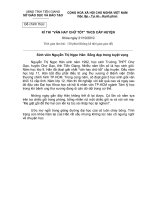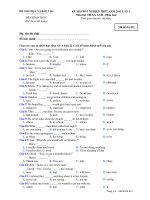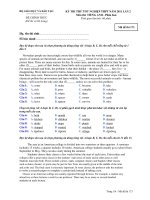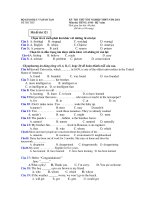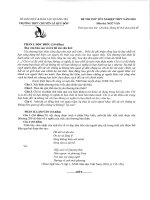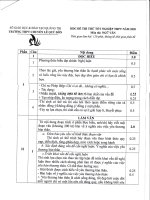Đề và hướng dẫn chấm - Kỳ thi thử Tốt nghiệp THPT năm 2020
Bạn đang xem bản rút gọn của tài liệu. Xem và tải ngay bản đầy đủ của tài liệu tại đây (4.68 MB, 6 trang )
<span class='text_page_counter'>(1)</span><div class='page_container' data-page=1>
DE
THr
rHrI
16r
NGHTEr
<sub>rHpr- </sub>
<sub>NAvr </sub>
<sub>zozo</sub>M6n
thi:
ffnNC
ANH
Thdi gian ldm
bdi:
60philt;
(50 cdu trdc nghiQm)(DC
<sub>thi </sub>
<sub>g6m c6 06 trang)</sub>Me
dothi
468
Mark
the letterA,
B, C,or D
onyour
answer sheet to indicate the<sub>underlined part that </sub>
<sub>needs </sub><sub>correction </sub><sub>in</sub>
each of the
following
questions.Question 1: Your secretarial duties include making business arrangements, correspond with potential clients
ABCD
and
filing
documents.Question 2: The tongue is the principle organ of taste, and is crucial for chewing, swallowing, and speaking.
A
so
GrAo
DUC&
EAO TAO
<sub>QUANG TRI</sub>TRUoNG
rHpr
cHUytN
<sub>r0 euf </sub>
o6N
B C <sub>D</sub>
D
Question 3: Each of the nurses <sub>report to the operating room when his or her name is called.</sub>
A
B <sub>C</sub>Mark
the letter A, B, C,or
D onyour
answer sheet to indicate the sentencethat
is closestin
meaning toeach of the
following
questions.Question 4: "You have to get all the letters sent
off
by tomorrow," said Jake to his secretary.A.
Jake told his secretary that she had to get all the letters sentoff
by the next day.B. Jake said to his secretary that she would get all the letters sent
off
by thefollowing
day.C. Jake told his secretary that she should send
off
all the letters by tomorrow.D. Jake said to his secretary that she had sent
off
<sub>all the letters by the day after.</sub>Question 5: <sub>There's no way that boy is Simon </sub><sub>because </sub><sub>he,s much taller!</sub>
A.
The boy can't be Simon because he,s much taller!B. <sub>That boy may not be Simon </sub><sub>because </sub><sub>he,s much taller!</sub>
C. <sub>That boy could be Simon </sub><sub>because </sub><sub>he,s much taller!</sub>
D. That boy must be Simon because he,s much taller!
Question 6: <sub>Thomas is more reliable than his roommate.</sub>
A.
<sub>Thomas' roommate is more reliable than him.</sub>B. Thomas is less <sub>reliable than his roommate </sub><sub>is.</sub>
C. Thomas is not as reliable as his roommate is.
D. Thomas' roommate is not as reliable as him.
1
Ihithli'2Arc-2A20 468
</div>
<span class='text_page_counter'>(2)</span><div class='page_container' data-page=2>
Mark
the letterA,
B, C,or
D onyour
answer sheet <sub>to indicate </sub><sub>the sentence </sub><sub>that </sub>
<sub>best combines each </sub><sub>pair of</sub>
sentences
in
thefollowing
questions.Question 7:
I
invited Ann to the party, but she couldn't <sub>come. She'd arranged </sub><sub>to </sub><sub>do something </sub><sub>else.</sub>A. I
invited Ann to the party in case she,d arranged to do something else.B.
If
Ann hadn't arranged to do something else, she would come to my party as invited.C' Ann <sub>would have come to my party provided </sub><sub>she'd </sub><sub>arrangedto do something </sub>
else.
D'
Without having arranged to do something else, <sub>Ann would </sub><sub>have come to my party </sub><sub>as </sub><sub>invited.</sub>Question 8: He was very surprised to be addressed <sub>by the eueen. He </sub><sub>didn,t </sub><sub>answer at once.</sub>
A' only
when he was addressed <sub>by the Queen could he </sub><sub>answer </sub><sub>the surprising questions at </sub>once.
B'
So surprised was he to be addressed <sub>by the </sub><sub>Queen </sub><sub>that </sub><sub>he </sub><sub>didn,t </sub><sub>answer </sub><sub>at </sub><sub>once.</sub>c.
Not until he was so surprised to <sub>answer did the eueen </sub><sub>address </sub><sub>him.</sub>D. But for such a nice surprise, he would have been addressed <sub>by the eueen.</sub>
Read the
following
passage andmark
theletter A,
B,c,
or
D onyour
answer sheet to indicate thecorrect
word or
phrasethat
bestfits
each <sub>of the numbered blanks </sub><sub>from </sub>
<sub>9 </sub><sub>to </sub>
<sub>13.</sub>Homework:
how useful isit?
Homework is an
(9)..-
part of schoollife
in<sub>most countries around the </sub><sub>world</sub>(10)_,
there is
still
considerable debate <sub>among teachers about whether homework </sub><sub>has </sub><sub>a </sub><sub>significant</sub>
educational value. On the one
side are those <sub>who claim that </sub><sub>it </sub><sub>takes </sub><sub>too much time away </sub><sub>from </sub>
<sub>(l </sub>
<sub>l</sub>
)--
more useful activities. On the otherare those who see homework as reinforcing school lessons so that concepts
rvill
not be for_uotten. (12)often neglected in this debate is<sub>the role of parental involvement</sub> <sub>and</sub><sub>x'hether or not the </sub>
child's home provides
support for effective homewor k. Parents in <sub>low-income families often do not </sub><sub>have</sub>
the time to make homework a
priority
or are <sub>not able to</sub> <sub>afford </sub><sub>a </sub><sub>computer or additional books. Whatever money they have</sub>goes <sub>on the basic</sub>
necessities of <sub>life-accommodation, food,</sub> <sub>clothing</sub><sub>and </sub><sub>heating. However, the (13</sub>
that only middle-class
parents support their children's <sub>education is quite obviously wrong. </sub><sub>Not all </sub>
<sub>well</sub>
-to-do parents give the support
they should, and some parents
living
<sub>in the most impoverished circumstances imaginable</sub> <sub>find </sub>the time and
energy to involve themselves intheir children's homework.
_1S
Question 9:
A.
exhaustedQuestion 10:
A.
HoweverQuestion 11:
A.
otherQuestion 12:
A.
WhoQuestion 13:
A.
ideaB. accustomed
B. Therefore
B. the other
B. Which
D. reason
C. allowed
C. Although
C. others
C. What
C. fact
D. established
D. Moreover
D. another
D. Whose
D. cause
Read the
following
passage andmark
theletter A,
Boc,
or
D onyour
answer sheet to indicate thecorrect
answer to each of the questions
from
14 tolg
Many people feel a <sub>mid-afternoon slump in mood </sub><sub>and </sub><sub>alertnesl. </sub>
Ma,nv <sub>people believe that this slump is </sub><sub>caused </sub>
by
eating a <sub>heavy lunch, or by getting </sub><sub>u </sub><sub>poor </sub><sub>night's </sub>
<sub>rr..p </sub>
<sub>irr. </sub>
niglrt before.
rr'r*iirri,
<sub>slump occurs naturally</sub>because <sub>humans were meant to </sub>
<sub>hive </sub>
<sub>a </sub><sub>mid_a-fternoo, </sub><sub>nup </sub>
---'Thithir 2Afi-2A20 468
2
</div>
<span class='text_page_counter'>(3)</span><div class='page_container' data-page=3>
Thomas Edison, Winston Churchill, Albert Einstein, and
Bill
Clinton are all famous fans of napping - andwith
good reason. Various evidence, including the universal tendency of toddlers and the elderly to nup i'n the
afternoon, and the afternoon nap of siesta <sub>cultures, have led many scientists to the </sub><sub>same </sub><sub>conclusion: nature tells</sub>
us to take a nap in the middle of the day. Short periods of sleep have been shown to improve alertness, memory
and motor skills, decision-making, and mood - all while cutting down on stress, carelessness, and even heart
disease.
Our biological urge to sleep in the middle of the aftemoon coincides
with
a slight <sub>drop in body temperature. This</sub>drop occurs whether we have lunch or not.
A
midday napis apartof
the daily ioutine of many cultures,especially those near the equator. This all seems to suggests that napping may have been
parttf
an ancientbiological signal to get us out of the hot midday sun.
Whatever the reason,
if
you have an opportunity for an <sub>afternoon nap, take one. Studies show that2Ominutes </sub><sub>of</sub>
sleep in the afternoon provides more rest <sub>than getting 20 minutes more sleep in the morning. </sub>
<sub>A </sub>
<sub>20-minute power</sub>nap provides the energy for a fresh burst of new ideas and energy. Naps seern <sub>to eliminate ihe </sub>need for more
caffeine during the workday, and this lowers stress.
The do's and
don'ts
of nappingThe early afternoon seems to be the best <sub>time to nap - approximately eight hours after you have woken up in the</sub>
morning. Twenty to thirty minutes is all you need to get the
full
rewards of a midday
nap. <sub>There is no proof that</sub>sleeping longer than
this
is any better; in fact, the opposite may be true.In the dark, our brains produce more of the sleep-inducing hormon e melatonin so close the blinds, tum off the
lights, and consider using a <sub>sleeping mask. Keep the temperature on the warrner side. </sub><sub>Don,t </sub><sub>forget to turn </sub>
<sub>off</sub>
your cell phone. And avoid caffeine for a few hours before a nap. Give
it
atry
for yourself, and-seeif
you aren,tamazed at the results!
Question
14:
The reading isprimarily
aboutA.
why our bodies get tired in theafternoon
<sub>B. </sub>
<sub>how much sleep is ideal for people</sub>C'
why afternoon naps are good forus
<sub>D. </sub>
which famous people are known for nappingQuestion
15:
A11 of thefollowing
are mentioned as things that are <sub>improved by napping except</sub>A.
alertness
B.
<sub>decision-making c. </sub>
<sub>food </sub><sub>digestion </sub>
<sub>D. </sub>
<sub>memory</sub>Question
16:
In paragraph 3, <sub>the word "coincides,, is closest in meaning to </sub><sub>_.</sub>
A.
occursbefore
B.
isaccidental
<sub>C. </sub>
<sub>is </sub><sub>unnoticeable </sub>
<sub>D. </sub>
<sub>happens </sub><sub>together</sub>Question
17:
The word"this"
in paragraph 5 mostly meansA.
twenty to thirtyminutes
<sub>B. </sub>
<sub>sleeping longer</sub>C.
approximately eighthours
<sub>D. </sub>
<sub>a </sub><sub>midday </sub><sub>nap</sub>Question
18:
In order to get a <sub>good nap, you should do </sub><sub>all </sub><sub>of the </sub><sub>following </sub>
<sub>except</sub>A.
turnoff
your cell phoneC.
make sure the room isn't too warmB.
make the room darkD.
avoid caffeine before sleepingRead the <sub>answer </sub><sub>to </sub>
following
passage andmark
theletter
A, B, C,or D
onyour
answer sheet to indicate thecorrect
each of the questions
from
19 to 25.In past <sub>centuries, Native Americans </sub>
<sub>living </sub>
<sub>in the arid </sub><sub>areas </sub>of what is now the southwestern United States relies
on a variety of strategies to ensure the success of their <sub>agriculture. First and foremost, water was the </sub><sub>critical</sub>
3
Thitht} 2affi-2a2a 468
h
rtno
-/
</div>
<span class='text_page_counter'>(4)</span><div class='page_container' data-page=4>
factor. The soil was rich because there was
little
rain to leach outownproblems. <sub>Long </sub>p.eriods of <sub>drought could have made </sub><sub>agricul</sub>
flood could just as easily have destroyed a crop.
the minerals, but the low precipitation caused its
ture impossible; on the other hand, a sudden
Several techniques were developed to <sub>solve the water problem. The simplest was to plant crops in the floodplains</sub>
and wait <sub>for the annual floods to water the young </sub>
<sub>..opr. </sub>
<sub>A </sub>
<sub>less </sub>dangerous technique was to build dikes or dams to
control the flooding.
I!9t.
dikes both protectedihe piants against &cessive flooding and <sub>prevented the water</sub>from escaping too quickly once
it
had arrived. Theliopi
p.o-pt" designed <sub>their fields in </sub>a <sub>checkerboard pattern,</sub>with many small dikes, each enclosing only one or two sialks of
maie
(corn),*rrit*
other groups built a seriesof
dams <sub>to control the floods. </sub><sub>A third </sub><sub>technique was </sub><sub>to </sub><sub>dig </sub>
<sub>inigation </sub>
ditches to
u.i"g
water from rivers. water wassometimes carried to the fields in jars, particularly
<sub>if </sub>
<sub>the </sub><sub>sea-son </sub><sub>was </sub><sub>dry. </sub><sub>Some </sub>"rop,
*...
planted where theycould be watered directly by the runoff from
cliff
walls.Another strategy Native Americans used to ensure a <sub>continuous food supply was to plant </sub><sub>their </sub>
crops in more than
one <sub>place, hoping that </sub>
<sub>if </sub>
<sub>one </sub><sub>crop failed, another </sub><sub>would </sub><sub>survive. </sub><sub>Howevli, </sub>
since the-soil was rich and not easily
exhausted, the same patch of ground could be <sub>cultivated year after year, whereas in the woodlands of the </sub>
eastern
United States it was necessary to abandon a plot of ground <sub>after afew years </sub>
oii**irg.
<sub>In the Southwest, often</sub>two successive crops were planted each year.
It was a <sub>common southwestern practice </sub><sub>to </sub><sub>grow enough food </sub>
so <sub>that some could be dried and stored </sub>
<sub>for</sub>
emergencies'
If
emergency supplies ran low, the peop-ie <sub>turned to the ro"ar </sub><sub>wila </sub>
jants. If
these failed, they moved
up into the mountains to gather the
wild
<sub>plants that might have suryived in the cooler atmosphere.</sub>Question
I9:
What does the passage mainly discuss?A. <sub>Native Americans methods </sub><sub>of </sub><sub>storing emergency food supplies</sub>
B. Irrigation <sub>techniques used by the </sub><sub>Hopi</sub>
C. Soil quality in the American Southwest
D. Agricultural <sub>methods of </sub><sub>Native </sub><sub>Americans</sub>
Question 20: Planting in the floodplains was not idear because
A. <sub>the amount of water could not be controlled</sub>
B. the crops could be eaten by
wild
animalsc.
<sub>the floodplains were too remote to be cultivated frequentry.</sub>D. corn grows better at high elevations
Question
2l:
The word "enclosing" <sub>in paragraph 2 is closest in meaning to </sub>_
A.
defending
<sub>B. </sub><sub>extending </sub>
C. surrounding
Question 22: The word ,,they,, <sub>in paragraph 2 refers to</sub>
D. measuring
A.
fields
<sub>B. </sub>jars
C.
crops
<sub>D. </sub><sub>walls</sub>Question 23:
why
did farmers in <sub>the Southwest plant crops </sub><sub>in </sub><sub>several places </sub>at the same time?
A'
They moved frequently from one place toanother.
<sub>B. </sub><sub>They feared that one </sub><sub>of </sub>the crops might
fail
c'
The size of each field was quitelimited.
<sub>D. </sub><sub>They wanted </sub><sub>to </sub>avoid overusing the soil.
Question 24: T'he word <sub>'opatch" in paragraph 3 is closest in meaning </sub>
<sub></sub>
to-.-A.
type
<sub>B. </sub><sub>group </sub>
C.
level
<sub>D. piece</sub>Question 25:
why
did farmers in the eastern woodlands periodically <sub>abandon </sub><sub>their </sub><sub>fields?</sub>A.
Seasonal <sub>flooding made agriculture </sub>impossible.
B. <sub>They experienced water </sub><sub>shortages.</sub>
4
</div>
<span class='text_page_counter'>(5)</span><div class='page_container' data-page=5>
C. They wanted a longer growing season. D. The minerals in the soil were exhausted
Mark
the letter A, B, C,or D
onyour
answer sheet to indicate theword(s)
CLOSESTin
meaning to theunderlined word(s) in each of the
following
questions.Question
2&
The people interviewed for the survey were randoml), selected.A.
carefully
B.carelessly
C.indiscriminately
D. innocentlyQuestion 272 The question was discarded because it was ambi
A.
incorrect B. vague C. biased <sub>D. dull</sub>Mark
the letterA,
B, C,or D
onyour
answer gheet to indicate theword(s) OPPOSITE in
meaning to theunderlined word(s)
in
each of thefollowing
questions.Question 28: His policies were beneficial to the economy as a whole.
A.
harmless
B.crude
<sub>c. </sub>
thoughtful
<sub>D. </sub><sub>detrimental</sub>Question 29: It's not a pleasant feeling to discover you've been taken for a ride by a close friend.
A. treated with
sincerity
B. deceiveddeliberately
C. given alift
<sub>D. </sub>
<sub>driven away</sub>Mark
the letter A, B, C,or
D onyour
answer sheet to indicate theoption that
best completes each of thefollorving exchanges.
Question 30:
Hary
is talking to a shopkeeper.- Harry:
"I'll
take these grapes, please."- Shopkeeper:
"
"
A.
Would youlike
abag?
<sub>B. </sub><sub>Can I help you?</sub>C. They're over
there.
<sub>D. We can,t decide.</sub>Question 31: Laura and Helen are talking about Bob, their schoolmate.
- Laura:
"l
think Bob is a good leader."- Helen:
"_."
His team alwayswin."
A.
I totallydisagree
<sub>B. </sub><sub>I </sub>
<sub>could </sub><sub>agree </sub><sub>more</sub>C. You must be
kidding
<sub>D. </sub>you
<sub>can </sub><sub>say </sub><sub>that again</sub>Mark
the letter A, B, C,or D
onyour
answer sheet to indicate theword
whoseunderlined part differs
from
the other threein
pronunciation in
each of thefollowing
questionsQuestion 32:
A.
foldq
B.packq
<sub>C. </sub>keepq
<sub>D. </sub><sub>liftg</sub>
Question 33:
A.
l4te
B.st4y
<sub>C. </sub>p4ce
<sub>D. bat</sub>Mark
the letterA,
B, C,or
D onyour
answer sheet to indicate the<sub>word that differs from </sub>
<sub>the </sub><sub>other three </sub><sub>in</sub>
the position of
primary
stressin
each of thefollowing
questions.Question 34:
A.
offer
B.promise
<sub>C. </sub>enter
<sub>D. </sub><sub>compete</sub>Question 35:
A.
important
B.wonderful
<sub>c. </sub>
confident
<sub>D. flexible</sub>5
Thi thfr 2019-2020*468
</div>
<span class='text_page_counter'>(6)</span><div class='page_container' data-page=6>
Mark
theletter
A, B, C,or
D onyour
answer sheet to indicate thecorrect
answer to each of thefollowing
questions.
Question 36: Many of the
stones illegally
A.
removingA.
hammerQuestion 42:
B.
axe
<sub>C. </sub><sub>tool</sub>leave
it
in the hospital for someone else to read.items such as rings, key chains, or souvenirs are made of unusual shells or unique
from the protected areas.
B.
removed
<sub>C. is </sub>removing
<sub>D. </sub><sub>is removed</sub>Question 37: There are a number of measures that should be
_
to protect endangered animals.A.
done
B.taken
<sub>C. </sub>made
<sub>D. </sub><sub>brought</sub>Question 38: I didn't
tell
you about the possibility of thetrip
becauseI didn't
want to<sub>_your </sub>
hopes.A.
raise
B.lift
<sub>C. </sub>boost
<sub>D. </sub><sub>follow</sub>
Question 39: Their daughter hasn't phoned ever since she
_
to America.A.
went
B.goes
<sub>C. is </sub>going
<sub>D. </sub><sub>has gone</sub>Question
40:-
repeated assurances that the product is safe, many <sub>people have stopped buying it.</sub>A.
Because
B.Despite
C.Although
<sub>D. </sub><sub>Because </sub><sub>of</sub>
Question 41: Tom's trying to persuade us to accept his own way of reasoning, but what we need is an
independent opinion
fiom
someone who hasno
to grind.D. stone
A.
After you had read thebook
<sub>B. </sub><sub>When </sub><sub>you have read the book</sub>B. Before you are reading the
book
D. <sub>While you were reading the book</sub>Question 43: You want to live in a clean and green place.
<sub>_-?</sub>
A.
aren'tyou
B. doyou
<sub>C. don,t </sub>you
<sub>D. </sub><sub>are </sub><sub>you</sub>Question 44: The sun is shining and there aren't any clouds in
<sub>_ </sub>
sky.A.
an
<sub>B. </sub>a
<sub>C. </sub><sub>the </sub>
<sub>D.</sub>Question 45: You can't
expect_
a foreign language in a few months.A. to
learn
B.learning
<sub>C. </sub>learn
<sub>D. </sub><sub>learned</sub>Question 462
If
I
on a desert island,I
would turnit
into a <sub>beautiful town.</sub>A.
live
B.will
live
<sub>C. </sub><sub>would </sub><sub>live </sub>
<sub>D. </sub><sub>lived</sub>Question
4Ttlthinkscientists
should not be allowed to perform<sub>_ </sub>
<sub>on animals. </sub><sub>It,s </sub><sub>cruel.</sub>A.
experiences
<sub>B. </sub><sub>duties </sub>
<sub>C. </sub><sub>experiments </sub>
D. miracles
Question 48: Workers are going
-
strike across the tJS to demand measures to protect their health dr.rring the
coronavirus pandemic.
A.
under
B.in
<sub>C. </sub><sub>on </sub>
<sub>D. over</sub>Question 49:
It
is <sub>important you attend training regularly </sub><sub>so </sub><sub>as </sub><sub>to-- </sub>
<sub>to the </sub><sub>best </sub><sub>of </sub><sub>your </sub>ability.
A'
competition
<sub>B' </sub>
<sub>compete </sub>
<sub>c. </sub>
<sub>competitive </sub>
D. competitively
Question 50:
we
arranged to meet Ann last night, but shedidn't
A.
showoff
<sub>B. turn </sub>up
<sub>C. run </sub><sub>out </sub>
D. get by
6
</div>
<!--links-->
